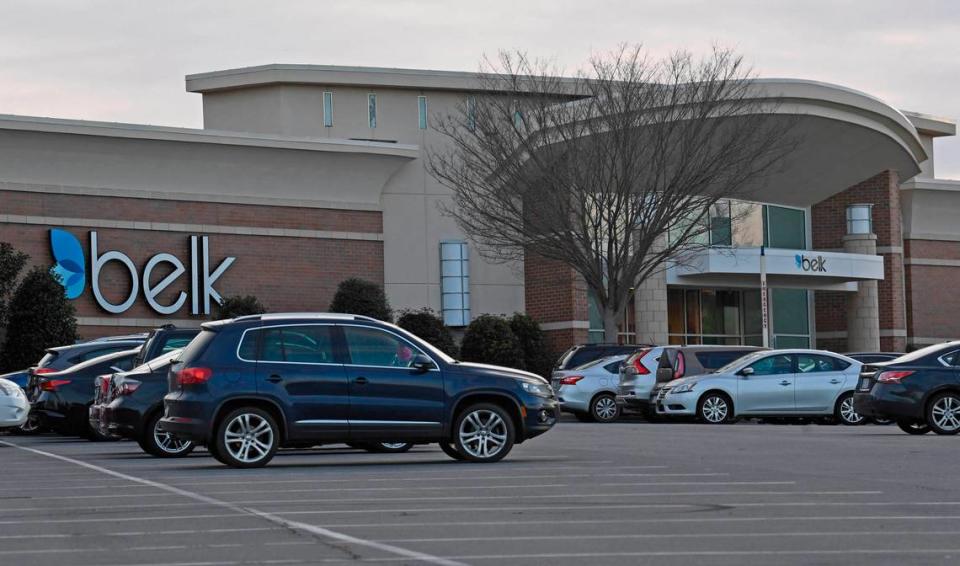Belk bankruptcy plan approved by judge. Iconic retailer gets the lifeline it sought.
Once one of Charlotte’s top companies, Belk filed Chapter 11 bankruptcy in Houston late Tuesday. It’s the first step in the retail icon’s reorganization plan that saw its owner, Sycamore Partners, cede a large stake of the company to its lenders while maintaining control.
The bankruptcy plan was approved Wednesday morning. It gave Belk a new infusion of capital and cut its debt load by about $450 million.
Combined, the moves provide the ailing department store chain financial breathing room as it grapples with the continuing effects of the COVID-19 pandemic.
“This is a rare chapter 11, your honor, where everyone wins,” said Steven Serajeddini, a lawyer for Belk, to Bankruptcy Judge Marvin Isgur at a Wednesday morning hearing.
“Nobody wanted to see a liquidation here,” Serajeddini said. Belk pledged to have no layoffs or stores closures as a part of the bankruptcy. Still, filings that Belk distributed to lenders hint that cuts could come after its exit from bankruptcy.
Belk was able to get in and out of bankruptcy in under 24 hours because Sycamore got almost all of Belk’s creditors to approve the terms of the deal in advance in what’s known as a pre-packaged bankruptcy. Pre-approval left fewer people with the ability to raise objections and gum up the works of a bankruptcy that is in-process.
A little more than five years since the Belk family sold the department store for $3 billion, Belk found itself bankrupt after a daunting debt load, shifting consumers tastes and a dying business model were all magnified by the COVID-19 pandemic.
After struggling financially for much of 2020, Sycamore announced in January that Belk would file bankruptcy and restructure.
“The COVID-19 pandemic directly resulted in drastic declines in sales, revenue, and liquidity,” said Belk’s Chief Financial Officer William Langley in a Tuesday filing alongside the bankruptcy.
Belk only had $7 million of available cash when it filed for bankruptcy, Matt Fagen, one of Belk’s lawyers, said in the hearing.
“Belk stands here today with an actionable and comprehensive solution to its capital structure and liquidity issues,” Langley said.

End of an era for Belk
While the bankruptcy provides a life raft, the long term sustainability of a department store like Belk is uncertain.
Such middlebrow department stores have seen interest wane for years, as stores like TJMaxx, Sephora and Lululemon took their shoppers. In a bid to capture changing tastes, CEO Lisa Harper said Belk would emphasize home goods, outdoor apparel and activewear going forward, according to the bankruptcy publication Reorg Research.
The bankruptcy has evoked bittersweet memories for many in the Charlotte area, for whom Belk was the place to buy a prom dress or land their first job.
Even Isgur joked that the other judge of Houston’s bankruptcy court, North Carolina native David Jones, would have had to recuse himself from the case because of his childhood memories at Belk.
With its headquarters on Tyvola Road in Charlotte, Belk has 17,000 employees and 291 department stores throughout the South.
For years, the Belk family that had controlled the business since founding it in 1888 used the stores’ profits to fund their roles in Charlotte’s civic and philanthropic life. That helped the Belk name become omnipresent in Charlotte, on stadiums, college dormitories and freeways.
While the stores will remain, the bankruptcy signals an implicit end of an era where Belk was not just a local store but a civic institution.
Unexpected venue
The venue for the bankruptcy, the Southern District of Texas, may appear a bit out of place because Belk has no stores in the Houston area. But the district is a hotbed of U.S. bankruptcies.
U.S. bankruptcy law effectively lets companies choose where they go bankrupt. Belk joined Nieman Marcus and others in choosing the Houston venue, where the two-judge panel turns around major corporate reorganizations faster than any other jurisdiction.
All of the creditors and shareholders that cast ballots in advance of the filing voted to approve Belk’s plan to exit bankruptcy, according to a filing.
Objections made
After addressing a small number of disputes, Isgur confirmed Belk’s bankruptcy plan shortly past 10 a.m. CST after a two-hour hearing.
Before confirming the plan, Isgur drafted an order that allowed those who allege their due process was violated by the speed of the bankruptcy to be able to object to the plan for roughly a month.
That order mollified the concerns of the U.S. Trustee, who had objected to the speed of the process, which Belk’s lawyers touted as a record pace for a company of its size.
A slate of other orders were approved that allowed Belk to continue to pay employees, among other tasks. By the end of the morning Belk was poised to return to business as usual, as it has done for over a century.

